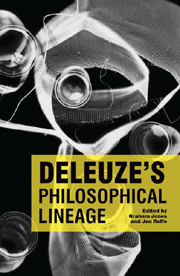Book contents
- Frontmatter
- Contents
- Acknowledgements
- List of Abbreviations
- Introduction: Into the Labyrinth
- 1 Plato
- 2 John Duns Scotus
- 3 G. W. F. Leibniz
- 4 David Hume
- 5 Immanuel Kant
- 6 Solomon Maimon
- 7 G. W. F. Hegel
- 8 Karl Marx
- 9 Hoëne Wronski and Francis Warrain
- 10 Bernhard Riemann
- 11 Gabriel Tarde
- 12 Sigmund Freud
- 13 Henri Bergson
- 14 Edmund Husserl
- 15 A. N. Whitehead
- 16 Raymond Ruyer
- 17 Martin Heidegger
- 18 Pierre Klossowski
- 19 Albert Lautman
- 20 Gilbert Simondon
- Bibliography
- Notes on Contributors
- Index
20 - Gilbert Simondon
Published online by Cambridge University Press: 12 September 2012
- Frontmatter
- Contents
- Acknowledgements
- List of Abbreviations
- Introduction: Into the Labyrinth
- 1 Plato
- 2 John Duns Scotus
- 3 G. W. F. Leibniz
- 4 David Hume
- 5 Immanuel Kant
- 6 Solomon Maimon
- 7 G. W. F. Hegel
- 8 Karl Marx
- 9 Hoëne Wronski and Francis Warrain
- 10 Bernhard Riemann
- 11 Gabriel Tarde
- 12 Sigmund Freud
- 13 Henri Bergson
- 14 Edmund Husserl
- 15 A. N. Whitehead
- 16 Raymond Ruyer
- 17 Martin Heidegger
- 18 Pierre Klossowski
- 19 Albert Lautman
- 20 Gilbert Simondon
- Bibliography
- Notes on Contributors
- Index
Summary
While the metaphysical troika of Spinoza, Nietzsche and Bergson which oversaw Deleuze's tumultuous ‘philosophical apprenticeship’ presents us with the potent, if controversial, image of a sort of philosophical counter-tradition – in which a Bergsonised Spinoza accompanies a Spinozistic Nietzsche and a Nietzschean Bergson – estimating Deleuze's relationship to the galaxy of often ‘obscure’ writers that populate his books (and lectures) is a difficult, and probably inconclusive, task. To begin with, Deleuze's practice of reference or citation poses some intriguing philological problems. At a remove from the ideological and procedural requirements of ordinary academic production, his references are not offered as tokens of authority, respectable citizens from the philosophical canon who could testify for the prosecution or the defence. There is a wilfully perverse, and not always persuasive, tendency in Deleuze sometimes to seek out authors with a pariah or occult status. But there is also, more importantly, an ethical imperative to rescue those ‘minor’ thinkers who have generated systematic speculative endeavours which the vagaries of ‘molar’ or ‘royal’ intellectual and academic consensus have sidelined. Raymond Ruyer and Gabriel Tarde come to mind. The latter's ‘renaissance’, for instance, has drawn much impetus from the long footnote in Difference and Repetition and the one-page homage to his work in A Thousand Plateaus. Tarde's case is emblematic of the manner in which Deleuze is capable of beguilingly compressing (‘implicating’, he might say) whole interpretations of thinkers in a few lines.
- Type
- Chapter
- Information
- Deleuze's Philosophical Lineage , pp. 380 - 398Publisher: Edinburgh University PressPrint publication year: 2009

